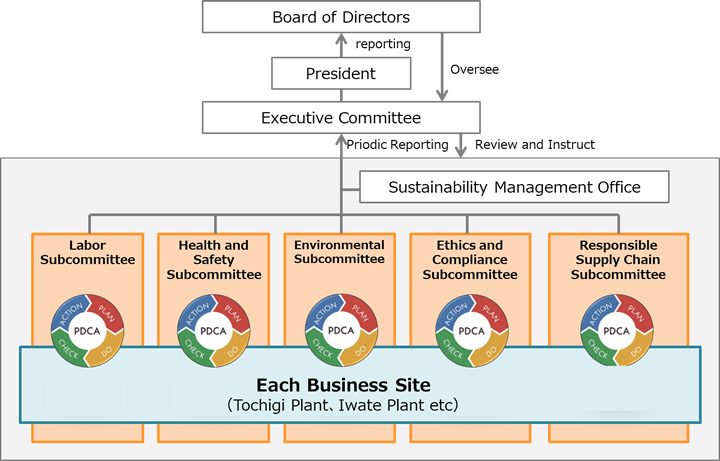Sustainability
Sustainabilityヘッダー
Sustainability Management Framework
1. Daisho Denshi Code of Conduct
Our corporate slogan, “Providing the World with Better.” embodies our commitment to ensuring that products developed with advanced technology and superior quality contribute to the lives of our customers both in Japan and abroad, and to creating a better and more prosperous society through the products in which they are used.
Today, the global community faces increasingly serious challenges such as poverty and inequality, labor issues, climate change, and resource constraints caused by population growth. In response, international regulations are being strengthened, and various countries are taking active measures. Companies are now expected to make even greater efforts to reduce environmental impact and engage in sustainable economic activities.
In the past, we established our Corporate Ethics Guidelines to serve as principles of conduct for all executives and employees, aiming to fulfill our social responsibilities as a company and to carry out sound business activities based on compliance with laws and corporate ethics. To further strengthen our initiatives to address social issues, we have revised these guidelines and established the Daisho Denshi Code of Conduct.
This Code of Conduct also reflects the RBA Code of Conduct established by the Responsible Business Alliance (RBA), an international industry coalition that promotes responsible business practices across global supply chains. We ask our valued business partners—who are essential to our operations—to join us in putting these principles into practice.
→ Daisho Denshi Code of Conduct
→ RBA Code of Conduct (External Link)
2. Management System
To ensure the effective implementation of the Daisho Denshi Code of Conduct, we have established corporate policies in the fundamental sustainability areas of Labor, Health and Safety, Environment, Ethics and Compliance, and Supply Chain Management.
Based on these policies, we have developed a management system designed to promote continuous improvement as follows:
¡ The Board of Directors determines key policies and other important matters related to sustainability and oversees the progress of initiatives toward their realization.
¡ The Executive Committee, which consists of directors and executive officers with management authority, periodically reviews whether the PDCA cycle of the management system is being properly implemented in accordance with decisions made by the Board of Directors, and reports the results to the Board as appropriate.
The Sustainability Management Office, which centrally manages the company’s management systems, serves as the secretariat for these reviews.
¡ Each Subcommittee, composed of members from departments related to the respective operations, takes the lead in operating the management system. These committees identify and evaluate risks in each area, in consultation with relevant departments at each business site, and manage and control them appropriately based on their level of significance.
They also develop concrete implementation plans and regularly evaluate and review performance to improve risk control and overall outcomes.
→ Top Message
→ Labor / Health and Safety
→ Environment
→ Ethics and Compliance
→ Supply Chain Management


